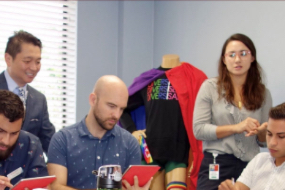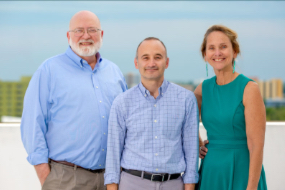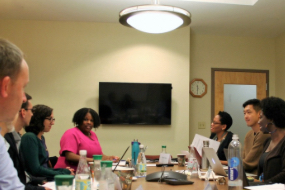 Microaggressions, HIV, and Black women in Miami
Microaggressions, HIV, and Black women in Miami
With Project MMAGIC, UM assistant professor of psychology will analyze how microaggressions and reoccurring violence affect Black women living with HIV.
Assistant Professor of Psychology Sannisha Dale is eager to get to work on her latest endeavor, Project MMAGIC. Developed with community engagement components and interdisciplinary collaborations across the University of Miami, Dale says Project MMAGIC (Monitoring Microaggressions and Adversities to Generate Interventions for Change) is a very special initiative, “it’s quite unique.”
Project MMAGIC press release
 Five Point Initiative
Five Point Initiative
Six University of Miami collaborative studies to test new HIV treatment and prevention strategies have received supplemental funding grants totaling $912,000 from the National Institutes of Health as part of the nationwide initiative “Ending the HIV Epidemic: A Plan for America.”
The one-year supplemental awards were made to 17 institutions that participate in the NIH-funded Centers for AIDS Research program and six AIDS Research Centers, funded by the NIH National Institute of Mental Health.
Five Point Initiative news item link
Mental and HIV in the Black Community
Dr. Dale’s interview on “Mental and HIV in the Black Community” with Crystal Lee. (2019, April 29). In Compassion. Miami, Florida: WMBM AM 1490
Mental Health and HIV
Dr. Dale’s interview on “Mental Health and HIV” with Supa Cindy. (2019, June 9). In Community Matters. Hollywood, Florida: 99 JAMZ FM (WEDR)
 New center formed to battle AIDS/HIV in Miami
New center formed to battle AIDS/HIV in Miami
Behavioral scientists establish a new mental health research center at the University of Miami to halt Miami's AIDS epidemic.
The United Nations' goal of ending AIDS around the world by 2030 is undeniably ambitious, but within tantalizing reach. Thanks to medications that suppress the once-fatal human immunodeficiency virus and prevent its transmission, new infections have dropped by nearly 50 percent over the past two decades.
Yet in 2017, Miami held the dubious distinction of being No. 1 in the nation for new HIV cases, with a rate nearly four times the national average.
Connect to News@TheU story here
 Study will examine role of ‘resilience’ among African Americans living with HIV
Study will examine role of ‘resilience’ among African Americans living with HIV
With a new $3 million grant, a multi-institutional team led by Brown University public health researchers will measure and test how ‘resilience,’ or the ability to flourish in spite of adversity, may lead to better HIV-related outcomes.
PROVIDENCE, R.I. [Brown University] — With studies showing that African Americans living with HIV disproportionately struggle to remain in care and maintain suppressed HIV RNA levels, a team of public health researchers will look for solutions in a new way: They will systematically and rigorously identify the resources that successful patients draw upon to overcome the pervasive pitfalls that hinder others.
The ability of some HIV patients to succeed in management of their HIV despite the considerable adversity they face is reflective of a concept called “resilience.” With a new $3 million, five-year grant from the National Institutes of Health, a research team led by Brown University School of Public Health assistant professors Chanelle Howe and Akilah Dulin Keita intend to turn the concept into a novel, validated public health measure that may better reflect the experiences of HIV patients and inform new kinds of intervention.
Read more about this story of resilience here...
 Life after: A survivor’s story by Dayna Altman
Life after: A survivor’s story by Dayna Altman
“Life After” is a documentary film project that follows survivors of sexual violence in their respective journeys to healing after an assault.
The film project aims to portray the different paths that are sought out by survivors from therapy to advocacy to the arts and exercise. It is hoped that this project not only shows the positive parts of healing and the strides that survivors have taken but also the symptoms that accompany such trauma such as nightmares, PTSD, other trauma related mental health disorders.
Watch the video and learn more about the project here....



 Microaggressions, HIV, and Black women in Miami
Microaggressions, HIV, and Black women in Miami Five Point Initiative
Five Point Initiative New center formed to battle AIDS/HIV in Miami
New center formed to battle AIDS/HIV in Miami Study will examine role of ‘resilience’ among African Americans living with HIV
Study will examine role of ‘resilience’ among African Americans living with HIV Life after: A survivor’s story by Dayna Altman
Life after: A survivor’s story by Dayna Altman